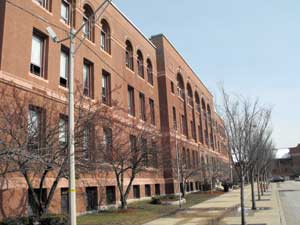
There have been no messages on the bullying hotline and four incidents reported online, said Director of Student Services Richard Melillo. - Photo by Bobbie Toner
By Ashley Taylor
Anonymous bullying services have been available to Somerville students and parents for nearly a month but the hotline remains cold.
There have been no messages on the bullying hotline and four incidents reported online, said Director of Student Services Richard Melillo.
The underwhelming use of the bullying hotline illustrates the difference between coming up with a system to deal with a problem and actually solving it. Massachusetts anti-bullying legislation, passed last May, required every school to come up with a plan to combat bullying.
According to the anti-bullying law, An Act Relative To Bullying, each school’s anti-bullying plan had to include anonymous reporting channels. Somerville’s Bullying Prevention and Intervention Plan, submitted December 9, outlined the anonymous bullying hotline and online reporting form. One could say that schools made a New Year’s resolution to prevent and deal with bullying, a resolution easier made than kept.
Melillo thinks the bully reporting hotline has gone unused because people simply report bullying in person: “I think that the rapport that staff have built-up with students has allowed them to report face-to-face. Our accessibility in the school system has been very strong, and that has been a good vehicle for reporting. That’s the primary method of reporting.”
A freshman girl leaving Somerville High School this Monday validated Melillo’s claim about in-person reporting. She said that last year, when she was in eighth grade, “A girl bullied me a lot.” When asked why, she said, “Because I was smaller than her, new to the school, new to the country.”
The girl told a teacher about the bullying, “They talked to [the bully], and she stopped. Then she started again, and then she stopped again. That’s it.” If she were bullied again, she said she would “tell a teacher. My parents first, of course.” Her response to bullying was to tell a trusted adult.
A freshman boy in a blue jacket waiting for the 88 bus outside Somerville High School described a senior who, “One time pushed me into a locker.” Another time, the same bully spit on his face. “He’s a spitter,” the victim said. A friend of the victim, also waiting for the bus, had witnessed the events. “The guy was mad at him, spit on his face. He started to cry.” The friend continued, “He’s done it to my friends, too.” Neither one of the freshman knew about the bullying reporting hotline. They did not report the bullying.
According to Melillo, the school has advertised the hotline on the school website and on cable television. Last week, teachers put up posters about it. There have been faculty and community bullying prevention and intervention trainings this February, and there will be another community training in May.
Cambridge, Medford and Arlington do not have bullying reporting hotlines.
Precedent for a bullying hotline comes from the Boston Public Schools. In February, 2010, according to a Boston Public Schools website, Mayor Thomas Menino launched an anti-bullying campaign and bullying hotline.
One difference between Somerville’s bullying hotline and Boston’s is that Boston’s bullying hotline has a live person on the other end. His name is Ed Donnelly.
“When anyone calls, I answer it,” Donnelly said. “It’s a cell phone the Boston Public Schools gave me. So I keep it with me all the time. If I can answer it, I answer it, if not, I let the message come and I call back.”
Donnelly’s voice exudes confidence and caring in a friendly and slightly impatient Boston accent. That confidence probably comes from Donnelly’s 35-year teaching and administrative career in the Boston Public Schools.
At first, the Boston Public Schools bully hotline was just an answering machine where you could leave your name and number and someone would call you back. Starting in September, 2010, Donnelly has been the voice on the other end of the line. He said that he receives five to 15 calls per day.
“But they’re not all reporting bullying,” Donnelly said. “A lot of them are, like you, asking for information about it. A lot of times it’s social workers who are asking for information. A lot of times parents are looking for clarification. A lot of times it’s principals and teachers asking if certain things are bullying or not bullying.”
Bullying is defined, to paraphrase the Massachusetts anti-bullying legislation, as repeated behavior that causes physical or emotional harm, is perceived as threatening, or disrupts a student’s education.
Callers to Boston’s bullying hotline can choose to remain anonymous; if they talk to Donnelly in person, they don’t have to give their information.
Donnelly gives advice according to the situation: “I’ll say, ‘Why don’t you try this, and then call me back?’ He continued, “I might say, ‘Oh, I know one of the assistant principals over there. They’re pretty good: have you tried calling them?’ or ‘That principal’s really good about stuff like that. Give him a chance to fix it.’”












Reader Comments